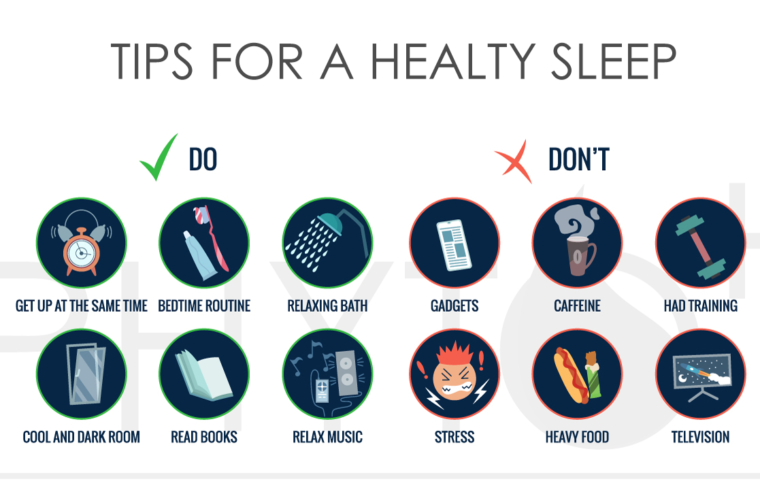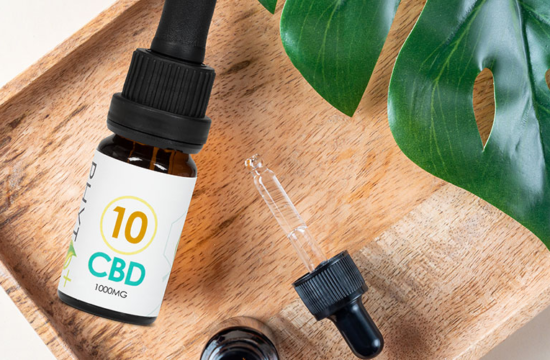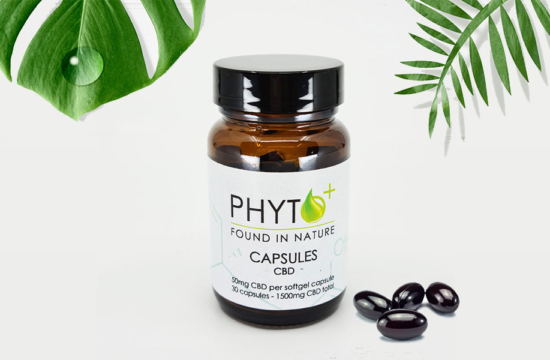Nights when you just keep tossing and turning, when your thoughts just won’t stop, and when you desperately long for a good night’s sleep – we’ve all experienced it at some point. Insomnia is like that annoying friend who never seems to leave when you ask him to. But what if I told you there’s a new ally in the battle against sleep problems? A friend who helps you relax and finally get that much-needed sleep? Welcome to the world of CBD oil for sleep.
You may have heard of CBD (cannabidiol), the non-psychoactive sibling of THC derived from the hemp plant. CBD is now available in various forms and sizes, but one of the most promising applications is its use in improving your sleep. So, let’s dive into what it actually is, how it works, and how it can help you finally get that well-deserved beauty sleep. It’s time to explore those nocturnal adventures with CBD oil!
Reading time approx. 11 minutes
Contents of this Blog
- What is Insomnia?
- What’s The Difference Between Poor Sleep and Insomnia?
- Poor Sleep
- Insomnia
- What Causes Insomnia? The Culprits Behind Sleep Troubles
- Circadian Rhythm and Sleep-Wake Cycle
- Effects of Sleep Deprivation Due to Insomnia
- Sleep Problems During Menopause: Menopause and Andropause
- Menopause (Women)
- Andropause (Men)
- So, What Can You Do If Your Sleep Is Disrupted by Menopause?
- How Does CBD Oil Help with a Good Night’s Sleep?
- How Much CBD Oil to Use for Deep Sleep?
- Using CBD Capsules
- CBN Oil as an Alternative to CBD Oil
- Does CBD oil for sleep also have disadvantages?
- Conclusion
What is insomnia?
Before we delve deeper into how CBD oil can help, let’s take a look at what it actually is. Insomnia is not simply a night of poor sleep; it’s a persistent problem where you have difficulty falling asleep, staying asleep, or waking up early and being unable to fall back asleep.
This sleep problem can have various causes, ranging from stress and anxiety to physical discomfort and lifestyle factors. Sometimes, it’s a short-term response to stressful events in our lives, while for others, it becomes a chronic issue that persists for months or even years.
Sleep problems can manifest in various ways:
- Difficulty falling asleep: You lie awake in bed for hours, toss and turn, but can’t seem to fall asleep.
- Sleep maintenance insomnia: You often wake up in the middle of the night and struggle to fall back asleep.
- Early morning awakening: You wake up way too early and can’t get back to sleep, even if you’re still very tired.
- Non-refreshing sleep: Even if you spend enough hours in bed, you still don’t feel rested in the morning.
- Short-term or chronic insomnia: It can be a short-term issue lasting a few nights or weeks, or a long-term and chronic problem lasting for months.
Insomnia can take a serious toll on your physical and mental health. It can affect your mood, reduce your energy levels, and even jeopardize your daily functioning. That’s why understanding the causes and seeking effective solutions is vital for a good night’s sleep. CBD oil is one of the emerging natural remedies that is gaining attention from people looking to overcome their sleep problems. In the next part of this blog, we will delve deeper into how it can help improve sleep.
staying asleep feels like a mission impossible
What’s the Difference Between Poor Sleep and Insomnia?
First, let’s clarify something: we’ve all had nights when we didn’t sleep well. Maybe you drank too much coffee, were worrying about an important presentation, or it was just too hot to sleep comfortably. But does that immediately mean you have a sleep problem? Not necessarily.
Poor sleep and insomnia are two different things, although they are sometimes confused. The main distinction lies in the duration and frequency of the problem:
Poor Sleep:
- This is usually a temporary issue and happens to almost everyone.
- It can be caused by external factors like stress, caffeine, screens, uncomfortable environmental conditions, or an irregular sleep pattern.
- People who experience poor sleep occasionally have nights where they struggle to fall asleep, stay asleep, or wake up early.
- It usually resolves itself when the underlying cause is addressed or disappears.
Insomnia:
- This is a persistent sleep problem that recurs over an extended period, typically at least three nights a week for three months or longer.
- It can be caused by both external factors and internal factors like anxiety disorders, depression, or other medical conditions.
- Individuals with insomnia often chronically struggle to fall asleep, stay asleep, or wake up early, even when there doesn’t appear to be a clear cause.
- It can have serious consequences for overall health and often requires targeted treatment.
So, if you occasionally have a rough night due to eating too much pizza before bed, it doesn’t necessarily mean you have insomnia. Insomnia is a serious condition with long-lasting effects. If you regularly struggle with sleep problems, it’s important to discuss this with a medical professional to receive the proper diagnosis and treatment.
What Causes Insomnia? The Culprits Behind Sleep Problems
Alright, let’s dive deep into the mysterious world of insomnia and see what the culprits can be. There are numerous factors that can contribute to sleep problems, and sometimes it’s a combination of different elements. Here are some common causes of insomnia:
- Stress and Worries: Perhaps the biggest culprit of them all. When your mind is filled with concerns, thoughts, and stress about work, relationships, or other life issues, it can be challenging to calm your mind when you go to bed.
- Physical Pain or Discomfort: Painful conditions like back pain, headaches, arthritis, or even just an uncomfortable mattress can disrupt your sleep.
- Poor Sleep Habits: Going to bed too late, having irregular sleep schedules, and using electronic devices like smartphones and laptops before bedtime can disrupt your biological clock.
- Caffeine and Alcohol: Enjoying coffee or a glass of wine can be momentarily pleasurable, but too much caffeine or alcohol can seriously interfere with your sleep.
- Psychological Disorders: Depression, anxiety disorders, and other psychological issues often go hand in hand with sleep problems. It’s a vicious cycle: insomnia can worsen these conditions, and vice versa.
- Medications: Some medications can have insomnia as a side effect. Always consult your doctor if you suspect medication is the cause.
- Environmental Factors: A noisy neighborhood, a partner who snores like a chainsaw, or an uncomfortable bedroom can all disrupt your sleep.
- Age: Unfortunately, we have no control over it, but sleep problems often become more common as we age.
- Hormonal Changes: For example, during menopause, hormonal fluctuations can cause sleep problems.
Understanding the specific cause of your insomnia is the first step in finding an effective solution.
Circadian Rhythm and Sleep-Wake Cycle
The term “circadian rhythm” refers to the natural biological clock that regulates our body’s daily rhythm, including the sleep-wake cycle. This internal rhythm, which lasts approximately 24 hours, influences when we feel sleepy and when we are alert and awake. Insomnia can have a significant impact on the circadian rhythm, which governs our body’s natural biological rhythm.
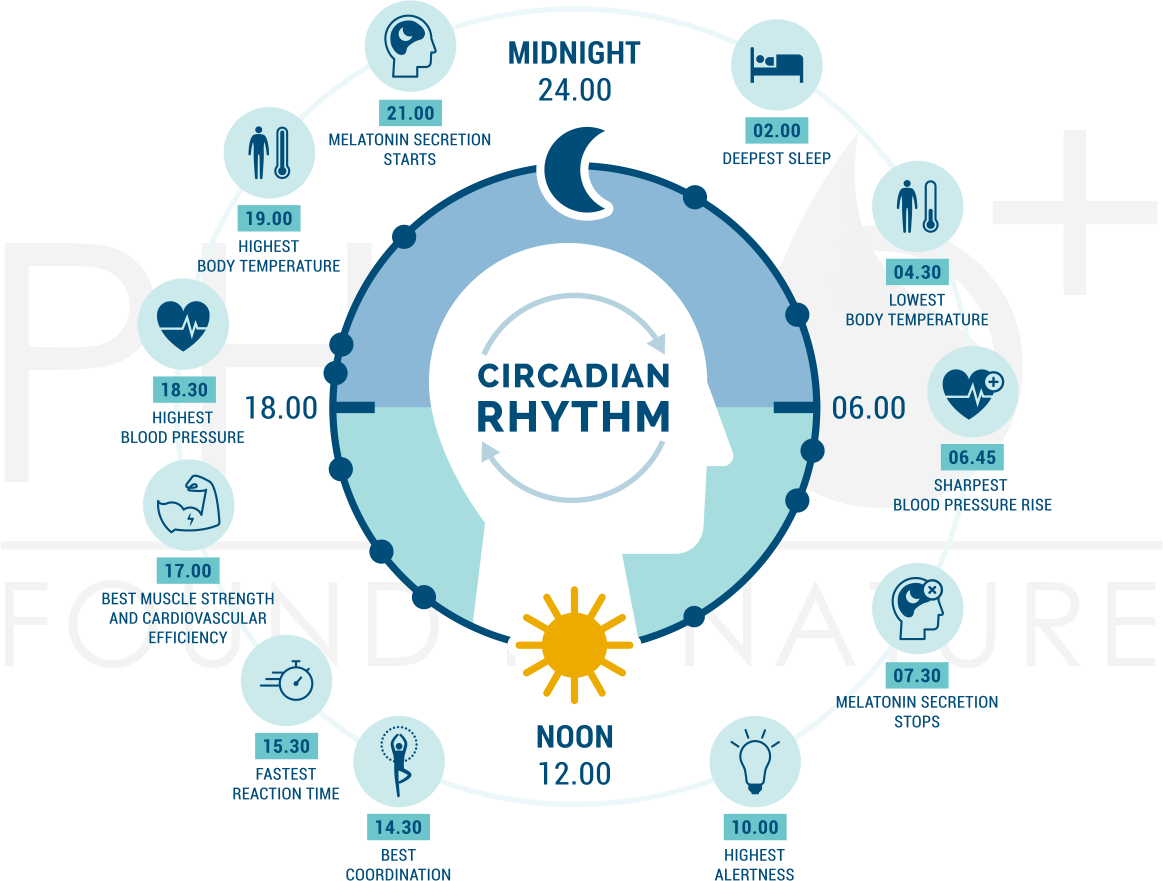
On the above image, you can see how our Circadian Rhythm operates 24 hours a day.
Circadian Rhythm:
The circadian rhythm is closely tied to the light-dark cycle of the natural environment. It is influenced by external cues such as daylight and temperature changes, as well as internal cues like hormonal fluctuations. This rhythm is responsible for regulating various bodily functions, including body temperature, hormone production, and the sleep-wake cycle.
Sleep-Wake Cycle:
The sleep-wake cycle is a component of the circadian rhythm and determines when we become sleepy and when we are awake and alert. During the day, we are typically awake and alert, while at night, we have a natural tendency to sleep. This pattern is largely regulated by the circadian rhythm.
Role of Melatonin:
A key hormone involved in the sleep-wake cycle is melatonin. Melatonin is produced by the pineal gland in the brain in the evening and promotes sleepiness. Exposure to light, especially blue light from electronic devices, suppresses melatonin production, keeping us more awake.
Disruption of the Circadian Rhythm:
Factors like night shifts, jet lag, and irregular sleep patterns can disrupt the circadian rhythm, leading to sleep problems such as insomnia and daytime sleepiness.
Optimizing Sleep:
To support a healthy circadian rhythm and optimize the sleep-wake cycle, it is important to develop regular sleep habits. This includes maintaining a consistent sleep schedule, limiting exposure to bright light before bedtime, and creating a quiet and dark sleep environment.
Understanding the circadian rhythm and how it affects our sleep is essential for achieving healthy and regular sleep patterns. By aligning our lifestyle and sleep habits with our natural rhythm, we can sleep better and feel more alert and energetic during the day.
Effects of Sleep Deprivation Due to Insomnia
Firstly, chronic fatigue. Insomnia means you repeatedly struggle to fall asleep, staying asleep feels like a mission impossible, and early waking becomes a regular morning routine. Even after spending a night in bed, you still feel as if you ran a marathon without training.
Then, there’s the emotional rollercoaster. People with insomnia often become friends with mood swings, irritability, and a free ticket to the anxious adventure. And we all know how these unwelcome guests can spoil the atmosphere in your relationships and at work.
Cognitive problems are also a thing. It seems that sleep problems negatively impact your cognitive abilities. So, daily tasks become a bit of a puzzle with missing pieces. Work mistakes? They suddenly become a regular item on your to-do list.
Let’s not forget about physical health. Chronic sleep deprivation can become friends with high blood pressure, diabetes, obesity, and even heart problems. As if that’s not enough!
And now, the heavy stuff: an increased risk of mental disorders. Yes, insomnia often seems to dance with depression and anxiety disorders. As if it weren’t complicated enough already.
Last but not least, it messes with your quality of life. It makes you socially isolated, causes you to distance yourself from activities you once enjoyed, and makes you feel like you’re in a maze with no way out.
Sleep Problems During Menopause and Andropause
Ah, the infamous transition years – a period that tests the sleep of many women (and men, in the case of andropause). Let’s take a look at how menopause and andropause can lead to sleep problems and what you can do about them:
Menopause (Women):
Menopause, which typically begins between the ages of 45 and 55, is the phase in a woman’s life when menstruation permanently stops. These hormonal changes can have a significant impact on sleep:
- Hot Flashes and Night Sweats: Hot flashes, often accompanied by heavy sweating, can occur at night and disrupt your sleep.
- Hormonal Fluctuations: Changes in estrogen and progesterone levels can cause sleep problems like insomnia or frequent nighttime awakenings.
- Mood Swings: The emotional and physical challenges of menopause can lead to anxiety and depression, worsening sleep problems.
Andropause (Men):
While less well-known than menopause, men also undergo a similar hormonal change called andropause:
- Testosterone Decline: Men experience a gradual decline in testosterone levels as they age, which can lead to sleep problems such as insomnia and fatigue.
- Mood Issues: Just like women, hormonal changes during andropause can lead to mood swings and increased stress, which can affect sleep.
So, What can you do if your sleep is disrupted by Menopause?
Here are some tips:
Consult a Specialist:
If sleep problems are severe or persist during the transition years, consider seeing a doctor. They can provide medical treatments and lifestyle advice.
Hormone Therapy:
For some women, hormone therapy during menopause can help manage symptoms like hot flashes and sleep problems. However, this should be discussed carefully with a doctor, as it carries risks.
Lifestyle Changes:
Paying attention to your lifestyle can be helpful. This includes regular exercise, a healthy diet, stress management techniques, and avoiding stimulants before bedtime.
Natural Remedies:
Using natural supplements like CBD oil to help fall asleep faster and alleviate sleep problems.
The transition years can be a challenging time for your sleep, but with the right approach, you can still enjoy good rest and a healthy lifestyle.
Everyone needs sleep, right?
How CBD Oil Helps with a Good Night’s Sleep
Alright, let’s talk about the star of the show: CBD oil and how it can act as the superhero you need for a good night’s sleep. CBD, or cannabidiol, is a natural component of the hemp plant and is praised for its potential sleep benefits. Here’s how it can work its magical powers:
Stress and Relaxation:
One of the major benefits of full-spectrum CBD is its ability to reduce stress. CBD interacts with your body’s endocannabinoid system, which plays a role in regulating stress and anxiety. By reducing stress, CBD can help you go to bed with a calmer mind, making it easier to fall asleep and enjoy deeper sleep.
Pain and Discomfort:
CBD also has anti-inflammatory properties, meaning it can help reduce pain and discomfort, such as muscle or joint pain. If physical pain is one of the reasons for your sleep problems, CBD oil can provide relief and make it easier to fall asleep.
Regulating Sleep-Wake Cycle:
CBD can influence your sleep-wake cycle by helping you fall asleep and stay asleep longer. Everyone needs sleep, right? The average 8 hours of sleep per day is the healthiest. It can also help extend the deep sleep phases like your REM sleep, making you feel more refreshed in the morning.
Anxiety and Depression:
If insomnia is caused or exacerbated by anxiety or depression, CBD oil can also come in handy. It can help reduce these symptoms, which, in turn, can improve your sleep.
No Psychoactive Effects:
Unlike THC, the other well-known component of cannabis, CBD has no psychoactive effects. This means you won’t get high from CBD extracts, and you can use it safely without worrying about side effects.
Individual Response:
It’s important to note that not everyone responds to CBD the same way. What works for one person may not work for another. It may take some experimentation to find the right dosage and timing that works best for you.
Before using CBD oil, it’s wise to consult with a doctor, especially if you are already taking other medications. They can guide you in safely and effectively integrating CBD into your sleep routine. CBD oil can be a promising natural option for addressing insomnia and finally getting that well-deserved rest.
How much CBD oil to use for deep sleep?
Ah, the big question; how many drops of oil to use! The right number of drops of CBD oil for a good night’s sleep can vary from person to person because it depends on various factors, including your individual tolerance, the type of CBD oil you’re using, and the severity of your sleep problems. Here are some general guidelines that can help you determine how much CBD oil to take:
Start With a Low Dosage
It’s always a good idea to start slowly and gradually build up. This helps to observe how your body responds to it and reduces the risk of side effects. For instance, you can start with CBD Oil 5%. If you find that you need something stronger after a while, you can always switch to CBD Oil 10%. This way, you get a stronger effect with fewer drops each time
Consult the Product Label
Most Quality CBD products contain information about the recommended dosage. This can be a good starting point, but remember that it’s just a general guideline.
Consider Your Weight
Generally, people with higher body weight may need a slightly higher dosage than those with lower body weight.
Listen to Your Body
While using CBD oil, pay close attention to how your body responds. Do you notice an improvement in your sleep after a certain dosage? Or do you experience mild side effects like dry mouth, drowsiness, or dizziness? Simply adjust your dosage accordingly.
Split the Dosage
Some people find it helpful to split their total daily dose of CBD into two parts, one in the evening and one before bedtime. This can help achieve a more consistent effect.
Consistency is Important
CBD oil may take some time to fully show its effect, so be patient and remain consistent with your dosage.
Consult a Professional
If you’re unsure about the right dosage, or if you’re taking other medications, it’s always a good idea to consult with a doctor before using CBD oil.
Using CBD Capsules
Is dripping CBD oil not your thing? Try CBD capsules! Dripping CBD oil may not be the ideal way for everyone to use this natural wonder remedy. Fortunately, there are alternatives, and one of the most convenient options is capsules. Capsules offer several benefits, especially for people who do not find the taste or texture of CBD oil pleasant or who prefer a standardized dosage.
If you’re not a fan of the taste of CBD oil, don’t worry. CBD capsules are tasteless and odorless, making them a discreet and easy way to take CBD. Each CBD capsule contains a pre-measured amount of CBD, ensuring you always know how much you’re getting. At Phyto Plus®, we offer two different concentrations: CBD Softgel Capsules at 10mg and potent CBD Capsules at 50 milligrams per capsule. This makes it easy to manage and adjust your dosage. CBD capsules are convenient to carry with you, allowing you to take your dose wherever you are.
It’s important to remember that CBD does not work the same way for everyone, so what works for one person may not work for another. It may require some trial and error to find the ideal dosage that best suits your sleep needs. If you’re starting with CBD oil as a sleep aid, begin with a low dose and give it some time to show its effects before adjusting the dosage. And always remember: safety comes first, so consult a healthcare provider if you have any questions or concerns about using CBD oil for sleep.
CBN Oil as an Alternative to CBD Oil
In addition to CBD, there is also CBN, or Cannabinol, which is an emerging star in the world of natural sleep improvement. While CBD is already quite well-known, CBN is becoming increasingly popular due to its specific benefits for sleep. Here’s why CBN oil can be an excellent choice for improving your sleep.
CBN is known for its specific impact on sleep-related issues. It can help with falling asleep and staying asleep, leaving you feeling more refreshed in the morning. Both CBD and CBN have natural calming properties. They can reduce anxiety and help calm your mind, which is essential for a good night’s sleep. Some CBN oils, such as Phyto Plus® CBN Oil 5%, also contain CBD for a synergistic effect. The combination of CBD with CBN can enhance the sleep benefits and provide a balanced formula.
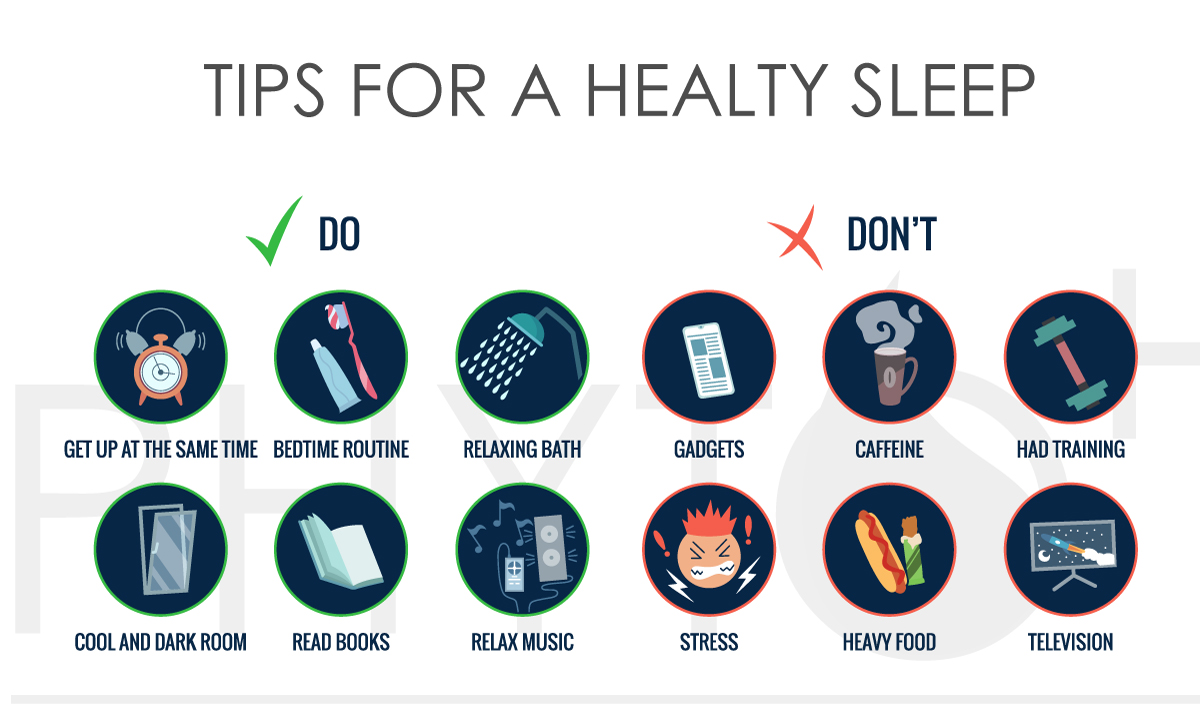
On this image, there are Do’s and Don’ts (tips!) for a healthy sleep routine.
Does CBD oil for sleep also have disadvantages?
While CBD oil shows promise as a natural approach to sleep problems, there are some potential drawbacks and side effects to consider:
Medication Interactions with CBD
CBD can interact with certain medications, especially drugs metabolized by the liver. If you are taking other medications in combination with CBD, it is advisable to consult with a doctor.
Variability in Effects of CBD Oil
CBD does not have the same effects on everyone. What works for one person may not work for another. It may take some time to find the right dosage and formulation that works for you.
Quality and Purity of CBD Products
The CBD industry is still relatively unregulated, so the quality of full-spectrum CBD oil can vary significantly. It’s important to buy products from reputable manufacturers and carefully check labels for ingredients and dosages. Want to buy the best CBD oil? Check out our CBD oil drops.
Tolerance and Dependence
Some people may develop tolerance to CBD over time, meaning they need increasingly higher doses to achieve the same effect. While CBD is not addictive like some other sleep medications, there is a risk of psychological dependence with long-term use.
Not Suitable For Everyone
CBD may not be suitable for everyone, especially not for pregnant women, breastfeeding women, and people with certain medical conditions. Always consult a doctor before using CBD oil, especially if you have health problems.
Cost
High-quality CBD oil can be expensive, especially if you need to use it regularly for sleep problems. This can be a financial consideration for some people.
It’s important to weigh the potential drawbacks and side effects of CBD oil and make an informed decision about its use for sleep problems. It is also wise to consult with a doctor before using CBD oil, especially if you are taking other medications or have health issues. Working together with a healthcare provider can help determine if CBD oil is suitable for your specific situation and what dosage best suits your needs.
Conclusion
In the quest for a good night’s sleep, there is no one-size-fits-all solution. What works for one person may not work for another. It is essential to be patient, listen to your body, and collaborate with a healthcare provider to find the best approach for your sleep problems.
CBD oil can be a valuable tool in promoting healthy sleep, but it should be used with care and integrated into an overall sleep routine. By paying attention to your lifestyle, stress levels, and the potential benefits of CBD oil, you can take steps towards the restful sleep you deserve.
Sources:
mdpi – 2012 – Cannabidiol in Humans—The Quest for Therapeutic Targets
Pubmed – 2019 – Cannabidiol in Anxiety and Sleep: A Large Case Series
Pubmed – 2017 – Cannabis, Cannabinoids, and Sleep: a Review of the Literature
ScienceDirect – 2022 – Cannabinoids, Insomnia, and Other Sleep Disorders


